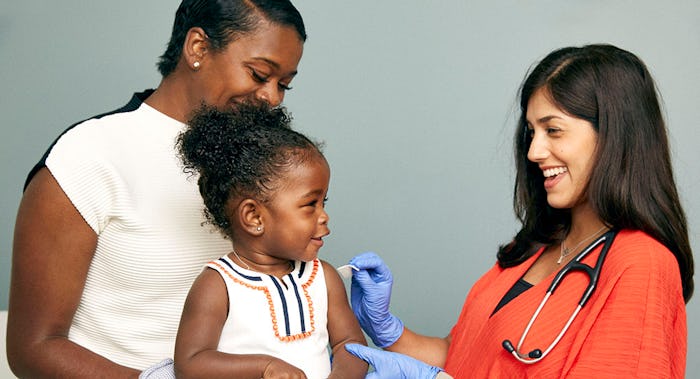Life
Here's What You Need To Know About Taking Little Ones To The Pharmacy For A Flu Shot
Scheduling a flu shot at your local pediatrician can be a bit of a pain. The hours aren't usually the best, and you're worried about all the germs. You know that some drug stores have flu shots, but what is the minimum age for flu shots at the pharmacy?
It really depends. Individual states have enacted laws that govern when and how pharmacists can act as immunizers. However, many pharmacies have clinics inside of the store, wherein they have a doctor, physician's assistant, or nurse practitioner available to see patients and administer flu shots. That takes the pharmacy out of the arena of "pharmacist as immunizer" and into an urgent care, medical personnel facility.
The best bet is to call the pharmacy ahead of time and see what their individual capabilities are, because many of the quick clinics might not treat infants or toddlers, because pediatrics require an additional level of education on the part of the provider. For example, CVS stated on their website that children must be over 18 months old to be vaccinated at a Minute Clinic, but over 5 years old in Connecticut, and over 2 years old in Kentucky. I am certain everyone gets a sticker, though. It's like voting — even the kids get in on the awesomeness.
But what's the age limit for flu shots at the pharmacy in other stores?Walgreens noted that the person receiving the flu shot needs to be 7 years old or older, but that 3-year-olds can be seen in their clinics. Rite Aid has taken the time to break it down by state on their website, and Target (their pharmacies are run by CVS), Publix, and Albertsons are all similarly equipped on their websites.
Even if you can't take your baby to the local Target to get their flu shot, you might find that your pediatrician is doing flu shot clinics. Many of the pediatricians in my area conduct these, and they're a great way to see a ton of kids in a short time, and get them all protected. No long office appointment — just in, jab, band-aid application, lollipop distribution, and out. My kids are basically masters of the flu shot at this point. They go in, pop up a sleeve, get the shot, and grab fistfuls of the lollis they can only get at the doctor's office. (They swear that there is a conspiracy afoot to only have the good lollipops at the doctor's office. They might be onto something.)
No matter what, you have to get yourself and all of your kids who are over 6 months old vaccinated. Flor Munoz, MD, FAAP, member of the American Academy of Pediatrics (AAP) Committee on Infectious Diseases noted that “the best way to keep children healthy and in school is to get the flu vaccine by the end of October. The flu virus is unpredictable, spreads easily, and can cause serious illness, so we urge vaccination in children and adolescents to protect them, their family, and community as well.”
I understand that giving your child a vaccine can seem scary. However, it is important to note that the Centers for Disease Control and Prevention (CDC) has stated vigorously the flu shot does not give you the flu. Also, even if your child still contracts the flu after getting the shot, having the flu shot can help make the symptoms of the flu less severe.
Getting a flu shot yourself and getting your children vaccinated isn't just for them — it's also to protect the vulnerable populations who cannot receive the flu shot, like those under 6 months old, or for whom the flu shot might not be as effective, like children and adults receiving chemotherapy or who have autoimmune disorders. It's really important.
This article was originally published on
